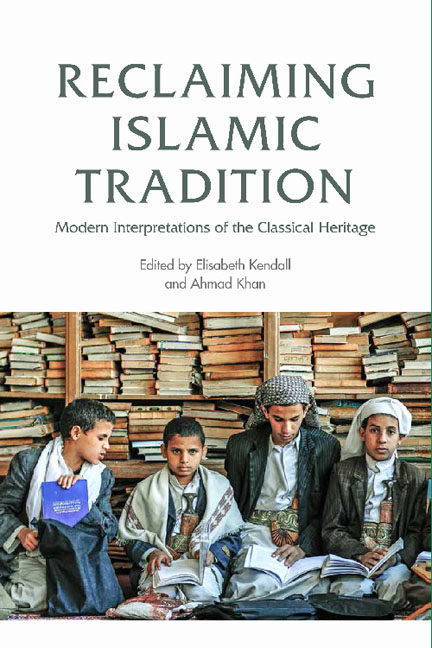Book contents
- Frontmatter
- Contents
- Acknowledgements
- About the Contributors
- Introduction
- 1 Modern Shiʿite Legal Theory and the Classical Tradition
- 2 Muḥammad Nāṣīr al-Dīn al-Albānī and Traditional Hadith Criticism
- 3 Islamic Tradition in an Age of Print: Editing, Printing and Publishing the Classical Heritage
- 4 Reaching into the Obscure Past: The Islamic Legal Heritage and Reform in the Modern Period
- 5 Reading Sūrat al-Anʿām with Muḥammad Rashīd Riḍā and Sayyid Quṣb
- 6 Contemporary Iranian Interpretations of the Qurʾan and Tradition on Women’s Testimony
- 7 Ibn Taymiyya Between Moderation and Radicalism
- 8 The Impact of a Sixteenth-Century Jihad Treatise on Colonial and Modern India
- 9 Jihadist Propaganda and its Exploitation of the Arab Poetic Tradition
- 10 Contemporary Salafi Literature on Paradise and Hell: The Case of ʿUmar Sulaymān al-Ashqar
- Index
6 - Contemporary Iranian Interpretations of the Qurʾan and Tradition on Women’s Testimony
Published online by Cambridge University Press: 11 November 2020
- Frontmatter
- Contents
- Acknowledgements
- About the Contributors
- Introduction
- 1 Modern Shiʿite Legal Theory and the Classical Tradition
- 2 Muḥammad Nāṣīr al-Dīn al-Albānī and Traditional Hadith Criticism
- 3 Islamic Tradition in an Age of Print: Editing, Printing and Publishing the Classical Heritage
- 4 Reaching into the Obscure Past: The Islamic Legal Heritage and Reform in the Modern Period
- 5 Reading Sūrat al-Anʿām with Muḥammad Rashīd Riḍā and Sayyid Quṣb
- 6 Contemporary Iranian Interpretations of the Qurʾan and Tradition on Women’s Testimony
- 7 Ibn Taymiyya Between Moderation and Radicalism
- 8 The Impact of a Sixteenth-Century Jihad Treatise on Colonial and Modern India
- 9 Jihadist Propaganda and its Exploitation of the Arab Poetic Tradition
- 10 Contemporary Salafi Literature on Paradise and Hell: The Case of ʿUmar Sulaymān al-Ashqar
- Index
Summary
Scholars of religion are well aware of the hermeneutical difficulty posed when a holy text says something that challenges widespread beliefs or values. In this paper I focus on modern Iranian methods of dealing with Q. 2:282. Qurʾan 2:282 states that women's testimony in cases of debt is half that of men’s, which poses a challenge to the notion of gender egalitarianism, and particularly to the notion that women's minds are equal to men's minds. I describe the conservative, the reformist and the neo-traditionalist methods of interpretation, categories which I have adopted from Ziba Mir-Hosseini, who uses the terms ‘traditionalist’, ‘neo-traditionalist’ and ‘modernist’. I have modified the terms she has used, because these terms imply that traditionalists are not modern and that reformists reject all aspects of tradition. Instead, all ʿulamāʾ use some aspects of tradition, and all modify it in some ways to incorporate widespread values, and this is evident in their approaches to gender roles. I ultimately argue that gender egalitarianism is a widespread modern value (not just a ‘Western’ value) in part by showing how notions of egalitarianism influence the interpretations of all ʿulamāʾ, including those who argue against egalitarian interpretations of the Qurʾan.
Reformists and neo-traditionalists embrace elements of gender egalitarianism. Conservatives argue instead for ‘complementarity’, in which men and women have fixed, complementary roles. This is entirely in keeping with pre-modern interpretations, which, though varied in many respects, were unanimously gender hierarchical. However, unlike pre-modern interpreters, modern conservatives clarify that the roles of men and women are equally valuable. In other words, the notion of egalitarianism is evident in conservatives’ justification for the ruling, rather than in its substance. Whereas pre-modern interpreters often justified their interpretations by pointing to women's defects, today such language has been jettisoned. Elements of equality between the sexes are emphasised, even in conservative interpretations where the ruling itself remains hierarchical or unequal. This is a prime example of the way that certain values can come to be a norm that is taken for granted, which in turn influences the interpretation of the Qurʾan.
- Type
- Chapter
- Information
- Reclaiming Islamic TraditionModern Interpretations of the Classical Heritage, pp. 160 - 176Publisher: Edinburgh University PressPrint publication year: 2018



